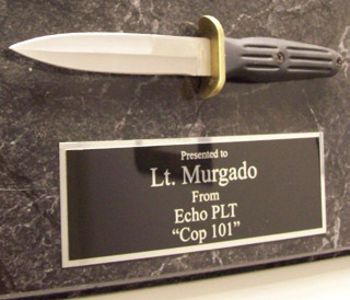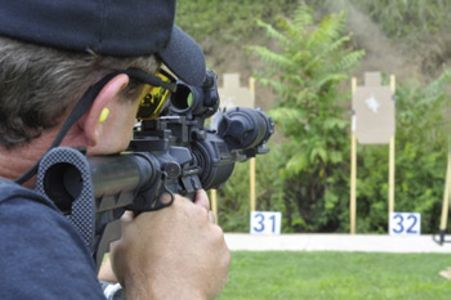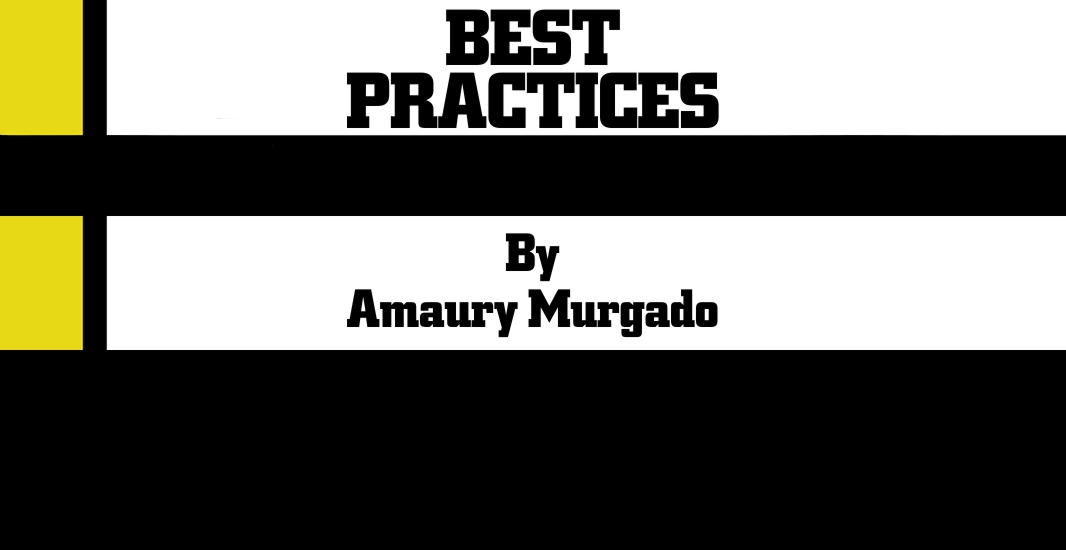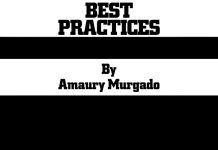Effective training acronyms and teaching terms can communicate larger concepts in a few letters.

Law enforcement officers present a tough audience for trainers and educators. Officers have highly attuned BS meters and they get restless and bored quickly because they just don’t like to sit around very much. To reach this audience, the trainer must have valuable information and he or she must present that information in a manner that’s both easy to comprehend and remember. The challenge for law enforcement trainers is how to effectively educate this audience.One of the best ways to train law enforcement offcers in a classroom setting is to chunk up material into quickly memorized bites. You can also maximize the effectiveness of training by using a variety of memory aids.
COP 101
Buzzwords create a shortcut in each officer’s mind to key concepts and terms.
Take for example the use of the term “COP 101.” It is often used to suggest key principles that include the fundamentals of police work, common sense, and the core values of professionalism.
I use COP 101 all the time when presenting material, instructing, or correcting subordinates. I use it so much that my former platoon gave me a plaque that read: “Lt. Murgado, COP 101.”
But using a shortcut term like COP 101 only gets you so far; its scope is still too broad. What would work better, is something equally as simple but more refined. The next logical step is to either look for an acronym or create one yourself that addresses your specific needs.
Acronyms
An acronym is a word that is formed from the first letters or groups of letters in a name or phrase. It is a form of a memory aid that helps people memorize key concepts or other important content. Acronyms are highly effective. That’s why they are used so extensively by law enforcement and the military.
Examples of common acronyms are numerous. I am sure that most officers are already familiar with such popular police training acronyms as OODA (observe, orient, decide, act), BRASS (breathe, relax, aim, slack, squeeze), and perhaps a few military acronyms such as SALUTE (size, activity, location, unit, time, equipment) or even CARVER (criticality, accessibility, recuperability. vulnerability, effect, recognizability).
As a trainer I couldn’t find an acronym to suit my specific needs so I created my own: TOPEKA (train, observe, prepare, evaluate, know, and adapt.)
So far, in using TOPEKA with my platoon, I have found it easier to stress the importance of the basics. It provides officers with a useful catch phrase and memory tool. Hopefully in the long run, it will prove to have a broader appeal and turn into something others want to use in their training as well.
Breaking It Down
TOPEKA was inspired in part by Topeka, Kan., the Topeka Police Department, and the unique quality of the name. It is the uniqueness of the name that makes it perfect for an
acronym. When you say Topeka, it has a nice ring to it, there is no other word that sounds like it, and therefore it is easily remembered.
I created the TOPEKA acronym for roll call training where time was limited. I wanted something that would tie in everything we had gone over in the past. I also wanted something I could stress in chunks or as one concept at a time.
The TOPEKA acronym is perfect for chunking. All you have to do is deconstruct the word one letter at a time for whatever examples or concepts you want to stress.
It’s clear that the meanings found in TOPEKA can cover a multitude of potential topics. That’s another valuable aspect of this acronym: its versatility. It becomes what you make of it. On some days you may only want to focus on a certain part of the acronym to drive home a point.
One of my sergeants informed me that on a recent call, one of our officers failed to see something significant and drove right past it. Another deputy commented later, “someone forgot what the O (observe) in TOPEKA stood for.” We both had a good laugh because it was the first time the use of the acronym had surfaced outside of training. Someone had actually been listening.
TOPEKA Decoded
Let’s take a quick look at how TOPEKA can be used in a roll call. I’ll break it down letter by letter.
Train: You must train consistently to stay on top of your game. This means going above and beyond what your agency offers you. For example, if all you do is train once a year in combatives, I doubt you will have any type of proficiency in this area. The skill sets will not be there when you need them. How you train is how you fight.
Observe: You need to be curious and pay attention. You can’t walk around with your head in the clouds. You have to be in the moment. Trust your instincts. If you get a funny feeling, it’s because you saw something suspicious but your brain hasn’t had time to process it. Rescan and check again. Be aware of your surroundings. You can’t just look, you need to see.
Prepare: My service in the Army taught me that it was better to have it and not need it than to need it and not have it. Use forward thinking. For example, carry a change of clothes in your vehicle in case you are exposed or contaminated with something. It will save time and help you stay in the game.
Evaluate: You are always making decisions and plotting out courses of action. Evaluate your decisions and then change them as necessary. What started out as reasonable might be unreasonable once you get to that point. A bad decision doesn’t have to stay that way.
Knowledge: No one can help you if you don’t know your job. The saying “knowledge is power” is true. If you know what you are doing or can acknowledge when you don’t, you will be a much more effective officer.
Adapt: Nothing ever stays the same for very long. Sometimes things seem one way and turn out to be another. You have to adapt or lose. Don’t be so entrenched that the saying “you can’t teach an old dog new tricks” becomes true. There was a time when the use of computers was a foreign concept and now it’s a way of life. Don’t get left behind.
You must train consistently to stay on top of your game. This means going above and beyond what your agency offers you.
TOPEKA’s Potential
Using TOPEKA as an acronym creates a forum to help you address key concepts and drive certain points home. So far, it’s worked out pretty well for me at my agency. Other supervisors have asked for the lesson plan and have adopted it for their use.
Some of our officers are also starting to remember it and use it as a guide for developing their own personal training. TOPEKA crosses over well to any law enforcement agency as the basics are common to all.
The TOPEKA acronym worked so well, that I thought it was a good idea to share it with the Topeka Police Department. After all, I did borrow the use of their city’s name. For those of you not familiar with this progressive department, it’s located in the capital city of Kansas and has 300 sworn officers who service a population of approximately 123,000 people.
I corresponded with Chief Ronald Miller and presented my idea of the TOPEKA acronym. Chief Miller advised he would look at it and get back to me. It turns out he liked what he referred to as the “TOPEKA Initiative” and stated he was forwarding the information to his command
staff. He went on to advise that his agency was incorporating it in its next department-wide in-service training block.
“We are always looking for positive ways to reinforce professional conduct by our officers and using TOPEKA is an excellent way to remind our officers and citizens of the importance of professionalism,” Chief Miller says.
I couldn’t ask for a better endorsement of an acronym’s training potential than that.
It’s important that we find ways to present our training messages effectively. The use of an acronym is just one way to accomplish this. I created TOPEKA as a way to help officers focus on fundamental principles and professionalism. Feel free to use it and make it your own.
Amaury Murgado is a road patrol lieutenant with the Osceola County (Fla.) Sheriff’s Office. He is a retired Master Sergeant from the Army Reserve, has 23 years of law enforcement experience, and has been involved with martial arts for 37 years.









